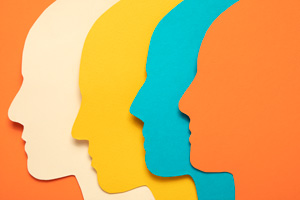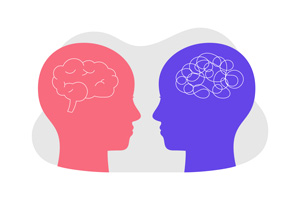Neurodiversity refers to the natural variations in human brain function.
 This includes but is not limited to, ADHD, autism spectrum disorder, dyslexia, and other conditions that affect how a person learns and processes information. These variations simply reflect the wide range of diversity in brain wiring and function, but neurodiversity does not make someone less capable or valuable. However, individuals with neurodiversity will usually face challenges in their daily lives, such as difficulties with learning, communication, social interactions, or sensory processing.
This includes but is not limited to, ADHD, autism spectrum disorder, dyslexia, and other conditions that affect how a person learns and processes information. These variations simply reflect the wide range of diversity in brain wiring and function, but neurodiversity does not make someone less capable or valuable. However, individuals with neurodiversity will usually face challenges in their daily lives, such as difficulties with learning, communication, social interactions, or sensory processing.
It is common for neurodivergent individuals to have overlapping mental health concerns. These may include anxiety, depression, and other mood disorders. Those concerns can be due to the ongoing challenges and difficulties associated with navigating a neurotypical society not designed for their unique ways of thinking and learning, such as school or work. It is important to recognize this overlap between neurodiversity and mental health because it can significantly impact how individuals experience and manage their mental health symptoms.
Normalizing Neurodiversity and Mental Health
An estimated 15-20 percent of the world’s population exhibits some form of neurodivergence, underscoring the importance of understanding and supporting neurodivergent individuals. They often face higher rates of mental health challenges, such as anxiety and depression. These statistics highlight the importance of using comprehensive interventions that address both neurodiversity and mental health, such as executive functioning strategies in addition to cognitive behavioral therapy, or even accommodations for students with learning differences.
By normalizing neurodiversity and mental health, we can reduce the stigma surrounding these conditions and promote a more inclusive society. Recent data from 2021–2022, the CDC reports that 10% of children aged 3-17 years have been diagnosed with current anxiety and 4% with depression. This data highlights how common these conditions are. It also emphasizes the need to build safe, supportive spaces where individuals can thrive, regardless of their neurodivergent or mental health challenges.
Common Co-Occurring Mental Health Conditions
Understanding the common mental health concerns that often overlap with neurodivergence is important for ensuring access to the appropriate support and care. Anxiety disorders are one type of co-occurring mental health condition that many neurodivergent individuals face, especially individuals with ADHD and autism. This can include generalized anxiety disorder, social anxiety, and specific phobias. Individuals who have ADHD or autism often feel things more intensely and deeply, which can lead to increased anxiety. Challenges with sensory overload, unexpected changes, understanding social cues, or handling tasks can increase stress. Fear of judgment and a lack of accommodations can also intensify these feelings, creating a cycle of worry that makes coping with daily life overwhelming.
Depression is another common mental health concern that overlaps with neurodiversity. Many individuals with ADHD and autism may experience feelings of low self-worth, isolation, or difficulty managing their emotions. This is due to how neurodivergence affects their brain function and can contribute to depression and impact their overall well-being. Having support, such as ADHD treatment in Arlington, MA, or CBT for autism, can greatly improve the mental health of individuals with neurodivergent conditions.
Additionally, other conditions like mood disorders, obsessive-compulsive disorder (OCD), and sleep disturbances are commonly observed among individuals who are neurodivergent. These conditions can worsen aspects of mental health concerns by making day-to-day life even more difficult. Healthcare professionals need to be aware of these potential comorbidities so that they can provide comprehensive care and support for their patients.
Factors Contributing to Overlap
 In understanding the overlap between neurodiversity and mental health concerns, it’s important to recognize the various factors that can contribute to this relationship. For instance, individuals with neurodivergent conditions may experience social isolation due to challenges in communication or understanding social cues. This can lead to feelings of loneliness and worsen symptoms of depression. Some contributing factors include:
In understanding the overlap between neurodiversity and mental health concerns, it’s important to recognize the various factors that can contribute to this relationship. For instance, individuals with neurodivergent conditions may experience social isolation due to challenges in communication or understanding social cues. This can lead to feelings of loneliness and worsen symptoms of depression. Some contributing factors include:
Social Challenges:
As mentioned, individuals with neurodiversity may struggle with social interactions and feel isolated from their peers. This can be due to difficulties in communication, understanding social cues, or feeling misunderstood by others. Cognitive behavioral therapy for autism and ADHD can help address these challenges by improving social skills and reducing anxiety. Ultimately enhancing mental health and decreasing feelings of loneliness and isolation. For instance, CBT for autism can teach individuals how to interpret and respond appropriately to social cues, improving overall communication and socialization.
Executive Functioning Challenges:
Many neurodivergent individuals also struggle with executive functioning skills, which are essential for organizing, planning, time management, and regulating emotions. Difficulties in executive functioning can lead to increased stress and anxiety, creating a ripple effect on mental health. For instance, an individual with ADHD may have trouble staying on top of school or work tasks due to organization or time management difficulties. This can result in added stress and frustration, potentially leading to anxiety and other mental health concerns.
Sensory Processing Issues:
Sensory processing issues can significantly impact individuals with neurodiversity, often contributing to heightened anxiety and stress. Many neurodivergent individuals experience an overwhelming response to sensory stimuli. This can include sensitivity to noise, light, textures, or even certain tastes and smells. These intense sensory experiences may increase feelings of discomfort or fear, making everyday environments more challenging to navigate.
Providing compassionate support and creating environments accommodating sensory preferences are crucial in reducing these overwhelming experiences. Techniques like sensory integration therapy or personalized sensory tools can create calming spaces. These approaches promote well-being and minimize stress. Recognizing and addressing these sensory processing issues fosters an empathetic understanding and helps individuals manage their sensory experiences more effectively.
Stigmatization and Misunderstanding:
Misunderstanding neurodiversity can worsen mental health issues. People with neurodivergent conditions often face stigma, increasing their isolation, anxiety, and depression. A lack of awareness fosters a culture of judgment instead of support. Creating a supportive environment that values understanding and compassion is key, especially for neurodivergent individuals. Education and advocacy are crucial in addressing and reducing the stigma surrounding neurodivergent conditions. By questioning societal norms and fostering open discussions, we can reduce stigma and empower neurodivergent individuals to thrive in a more welcoming community.
Implications for Support and Intervention
 To effectively support neurodivergent individuals facing mental health concerns, adopting a comprehensive treatment approach is crucial. This means considering the interconnectedness of neurodiversity and mental health and providing care that addresses both aspects. By combining mental health services with specific support for neurodivergent conditions, we can address overlapping needs more holistically. For example, facilitating accessible ADHD treatment in Arlington, MA, alongside cognitive behavioral therapy for autism, enables a multidisciplinary approach that caters to unique individual requirements.
To effectively support neurodivergent individuals facing mental health concerns, adopting a comprehensive treatment approach is crucial. This means considering the interconnectedness of neurodiversity and mental health and providing care that addresses both aspects. By combining mental health services with specific support for neurodivergent conditions, we can address overlapping needs more holistically. For example, facilitating accessible ADHD treatment in Arlington, MA, alongside cognitive behavioral therapy for autism, enables a multidisciplinary approach that caters to unique individual requirements.
Creating personalized therapeutic strategies is essential for interventions that address neurodivergent traits and mental health needs.
This approach makes treatment more individualized, targeting behavioral support and emotional health. Cognitive behavioral therapy for autism, for instance, aids in managing social interactions and anxiety, enhancing mental well-being in a nurturing setting.
Equally important are advocacy and education, which play key roles in breaking down stigma and boosting support systems. By spreading awareness and understanding of neurodiversity, we can work towards a more compassionate society that values inclusion. Educational initiatives that inform the public about the needs and strengths of neurodivergent individuals can drive meaningful change, empowering them to thrive in an empathetic and respectful community.
Understanding the overlap between neurodiversity and mental health concerns is crucial in providing effective support and intervention for individuals. By recognizing the various contributing factors and adopting integrated care approaches, we can create a more inclusive and supportive environment for neurodivergent individuals to thrive in their unique ways.
Feel Supported with Cognitive Behavioral Therapy for Autism & Other Neurodivergent Conditions
If you or your loved one is neurodivergent, it can often feel as if the world is not designed to accommodate your unique needs. At Bain Health and Wellness Center, we understand the challenges faced by those with neurodivergent conditions and offer specialized care to support their mental health. Our team of skilled professionals provides various services, including cognitive behavioral therapy for autism and ADHD treatment in Arlington, MA. We believe every individual deserves compassionate and personalized care to thrive in their journey toward mental well-being. Take the first step toward healing:
- Reach out today to begin your free 20-minute consultation.
- Speak with an experienced therapist.
- Feel supported and empowered to manage your mental health journey with confidence and understanding.
Other Therapy Services Offered at The Bain Health and Wellness Center in Arlington, MA
If you believe your child could benefit from therapy, reach out to the Bain Health and Wellness Center (BainHWC). We offer in-person and online therapy for teens struggling with depression, trauma, anxiety, ADHD, autism, OCD, parent coaching, and more. All mental health therapists at BainHWC are trained in evidence-based treatment and have several years of experience working with children, teens, and young adults.






